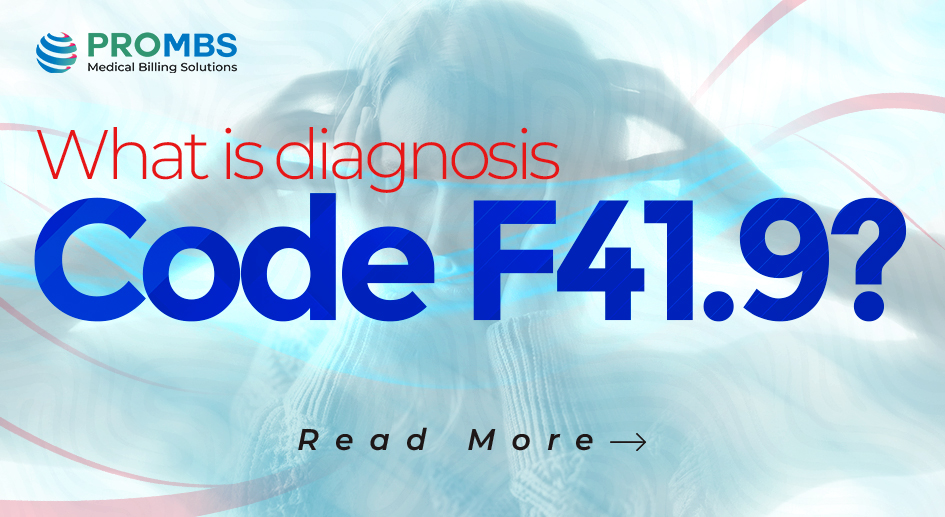ICD-10 Code F41.9 is a billable medical code used for the diagnosis and reimbursement of Anxiety Disorder, Unspecified. This code corresponds to the ICD-9 code 300 and is utilized by healthcare providers to identify and categorize anxiety disorders that do not fit into a specific subtype.
What is Anxiety Disorder, Unspecified (F41.9)?
Anxiety Disorder, Unspecified, is a category of psychiatric disorders characterized by excessive, uncontrollable worry and fear that are not attributed to any particular cause or condition. This diagnosis is used when a patient’s anxiety symptoms do not meet the criteria for any specific anxiety disorder defined in the ICD-10.
Synonyms for F41.9 Anxiety Disorder
- Anxiety
- Anxiety disorder
- Anxiety in childbirth
- Anxiety in pregnancy
- Anxiety antepartum (before childbirth)
- Postpartum anxiety (after childbirth)
- Chronic anxiety
Symptoms of Unspecified Anxiety Disorder (F41.9)
Symptoms of unspecified anxiety disorder include:
- Persistent worry or fear
- Restlessness or feeling on edge
- Irritability
- Difficulty concentrating
- Muscle tension
- Sleep disturbances
- Fatigue
These symptoms can vary in intensity and may be accompanied by physical symptoms such as palpitations, sweating, and dizziness.
Causes of Unspecified Anxiety Disorder (F41.9)
The exact causes of unspecified anxiety disorder are not well understood, but several factors may contribute, including:
- Genetic predisposition
- Environmental stressors
- Neurobiological factors
- Traumatic experiences
- Chronic medical conditions
Grasping these fundamental factors is essential for accurate diagnosis and treatment.
Differential Diagnosis for Unspecified Anxiety Disorder (F41.9)
When diagnosing unspecified anxiety disorder, healthcare providers must differentiate it from other conditions with similar symptoms, such as:
- Generalized Anxiety Disorder (GAD)
- Panic Disorder
- Social Anxiety Disorder
- Post-Traumatic Stress Disorder (PTSD)
- Major Depressive Disorder
A thorough evaluation, including medical history and psychological assessment, is necessary to rule out these conditions.
Is Unspecified Anxiety Disorder (F41.9) Serious?
Yes, unspecified anxiety disorder can be serious and significantly impact a person’s quality of life. If not addressed, it can result in:
- Chronic stress
- Interference with daily activities
- Strained relationships
- Decreased productivity
- Increased likelihood of developing additional mental health disorders.
Early diagnosis and treatment are essential to manage symptoms and improve outcomes.
Treatment for Unspecified Anxiety Disorder (F41.9)
Treatment typically involves a combination of:
- Psychotherapy: Cognitive-behavioral therapy (CBT) is particularly effective.
- Medications: Antidepressants, benzodiazepines, and beta-blockers may be prescribed.
- Lifestyle Changes: Regular exercise, a healthy diet, and stress management techniques can help.
- Support Groups: Connecting with others experiencing similar issues can provide comfort and advice.
Billing Guidelines for ICD-10 Code F41.9
When submitting claims for unspecified anxiety disorder, it is important to include:
- Accurate patient information
- Detailed visit information
- Proper use of CPT and ICD-10 codes
- Modifiers if applicable
Preventing Claim Denials
To prevent claim denials for F41.9:
- Make sure all necessary information is thorough and precise.
- Use the correct diagnosis and procedure codes.
- Follow payer-specific guidelines for submission.
Why Choose PROMBS for Medical Billing Solutions?
At PROMBS, we specialize in medical billing and coding, ensuring healthcare providers receive accurate and timely reimbursements. Choose PROMBS for reliable, efficient, and expert medical billing services. Let us handle the complexities while you focus on providing excellent patient care. Get a free Quote today (725) 237-2757.
